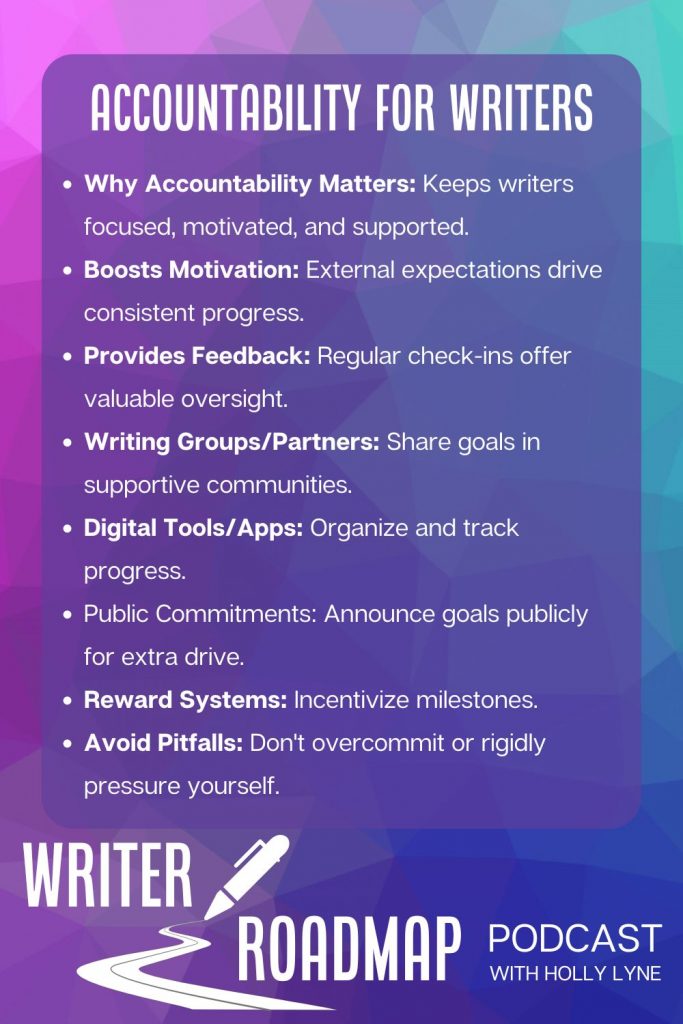Episode 046 – Accountability for Writing Success
On today’s podcast, we talk about one of the most vital elements of writer success. If you want to follow through on your plans and achieve your goals, you need accountability.
*Affiliate links may be included. You never pay more, but I may make a small commission on your purchase. This helps to pay for the running of this site.

Listen now wherever you stream podcasts.
Transcript
Welcome to Writer Roadmap, the podcast for writers seeking inspiration, guidance, and support on their creative journey. I’m Holly Lyne, and today we’re unpacking a crucial topic that often goes overlooked but can dramatically enhance your productivity and commitment to writing: accountability. Whether you’re drafting your first novel or polishing your latest manuscript, accountability can be the compass that keeps you oriented towards your goals. Let’s dive into why it’s so critical for writers and explore some effective strategies to harness its power.
Why Accountability Matters for Writers
Accountability is the secret ingredient that can transform good intentions into tangible results. It’s particularly vital for writers because:
- Keeps You On Track: Writing, especially long projects like novels, can be daunting. Accountability ensures you make consistent progress by setting milestones and deadlines that you’re committed to meeting.
- Increases Motivation: Knowing that someone else is aware of your goals and progress can significantly boost your motivation. It’s about harnessing our natural desire to meet expectations—not just our own, but those of others too.
- Provides Support and Feedback: Regular check-ins with accountability partners or groups offer not just oversight, but valuable feedback and encouragement, helping you refine your work and push through challenges.
Effective Accountability Mechanisms for Writers
Writing Groups or Partners: Engage with a writing group or find a writing partner where you can share your goals, work, and progress. These relationships create a structured support system that can motivate you to keep going, especially on tough days.
Digital Tools and Apps: Utilize project management tools or writing apps that allow you to set goals, track progress, and even share these metrics with others. Apps like Scrivener, Trello, or even a simple spreadsheet can help you stay organized and accountable.
Scheduled Check-ins: Set up regular meetings or check-ins with a mentor, coach, or peer group. These not only keep you accountable but also give you a platform to discuss obstacles and achievements, gain insights, and receive encouragement.
Public Commitments: Sometimes, announcing your goals to a broader audience, such as on a blog, social media, or a podcast, can dramatically heighten your sense of responsibility to follow through. The public nature of the commitment acts as a strong motivator.
Reward Systems: Create personal incentives for meeting targets. Whether it’s treating yourself to something special or simply acknowledging your progress, rewards can make the process enjoyable and motivate you to stick to your commitments.
Pitfalls to Avoid in Accountability
While accountability is incredibly beneficial, here are some pitfalls to avoid:
- Overcommitting: Ensure that your accountability goals are realistic. Overcommitting can lead to stress and burnout, which are counterproductive.
- Negative Pressure: While accountability should be motivating, it shouldn’t cause excessive pressure or stress. The goal is to foster a positive and supportive environment.
- Lack of Flexibility: Be willing to adjust your goals and timelines based on realistic assessments of your progress and life circumstances. Rigidity can make accountability feel like a burden instead of a support.
Conclusion
Accountability isn’t just about keeping you in line; it’s about empowering you to meet your goals with enthusiasm and discipline. As writers, we are often our own bosses, and setting up external structures of accountability can make all the difference in how effectively and joyfully we pursue our craft.
If you’ve found particular accountability strategies effective, or have stories about how accountability has helped you in your writing journey, I’d love to hear about them. Let’s continue to support each other and grow together as a community.
Remember to subscribe to Writer Roadmap, and share this episode with someone who might benefit from integrating more accountability into their writing life. Until next time, keep writing, keep committing to your goals, and keep navigating your journey with confidence and support.
Writer Roadmap intro and outro music used under license from Pixabay. Music track “Salangseuleoun” was Created by “Dayfox”.
Leave a Reply